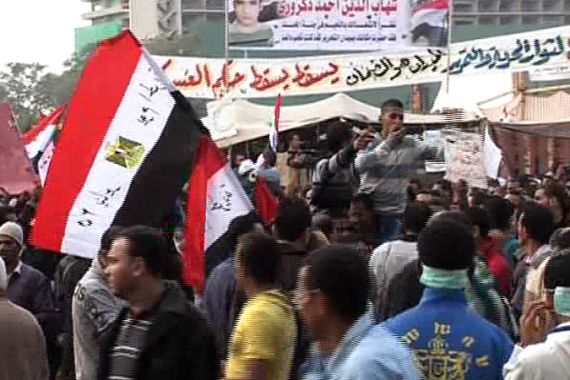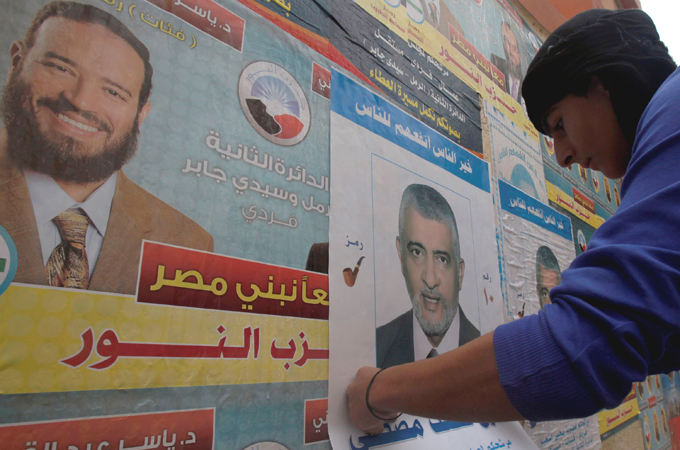Band of activists prefer poll boycott
Some say elections under military rule represent a useless step in the wrong direction.

 |
| Some voters say they will not vote due to a lack of familiarity of candidates and the police crackdown [Reuters] |
CAIRO, Egypt – The focus of the international media on the first day of Egypt’s parliamentary elections is on the long queues outside the polling stations.
But away from the spotlight and the elections, a boisterous band of activists ranged against military rule are hellbent on boycotting what is billed as the country’s first free and fair polls since Hosni Mubarak’s ouster.
State-run media’s get-out-the-vote campaign have failed to budge them from their decision to boycott the polls.
In their view, any election under the present circumstances would represent a useless step in the wrong direction, possibly heralding a powerless and illegitimate parliament.
The reasons for their dischantment are diverse. Many do not trust the military, while others are angry over the recent violent crackdown on protesters in Cairo and elsewhere. For some others, the election rules are too complicated and the candidates in the fray are simply unfamiliar.
|
“It’s ridiculous that anyone believes a political party can draw any constitutional power from SCAF“ – Freelance journalist, Mohamed Effat |
Mohamed Effat, a freelance journalist, told Al Jazeera he had been planning to vote before the military and riot police cracked down on a small sit-in at Tahrir Square on February 19, but that now “it just doesn’t make any sense to give legitimacy to the military junta”.
Effat and other activists cite recent remarks delivered by General Mamdouh Shahin, a member of the SCAF, who explained the limited powers of the coming parliament in an interview on Saturday. The legislature will not be able to question or appoint ministers or convene or dissolve on its own accord.
“This is what the Islamists have been fighting for,” Effat said. “It’s useless, it’s a marionette … It’s ridiculous that anyone believes a political party can draw any constitutional power from SCAF.”
Maggie Osama, who has also been attending the sit-ins at Tahrir Square and the parliament building, said her opinion about boycotting had also solidified since the November 19 crackdown, which resulted in six days of violence between protesters and riot police around Tahrir Square and dozens of deaths.
“Not a single party showed up in the square, nor did they offer their support for the sit-in” after the violence, Osama said. “All parties are looking for chairs in the parliament and not to stop these bloody massacres.”
Different priority
For Osama and others, the priority is to force the military to return to its barracks and relinquish all political power to a civilian council with full authority – the proposed “national salvation” government led by Mohamed ElBaradei, a presidential candidate and Nobel laureate.
Many people Osama knows had planned on voting before the violence began but have now reconsidered, she said, especially after “no parties showed up in the square”.
The Brotherhood, through its Freedom and Justice Party, will win a large majority in the election, Osama said, but it will have lost its “street legitimacy” for coming out publicly against the protests.
Some prominent individuals have backed the boycott call. Aida Seif el-Dawla, who founded the well-known El Nadim Center for the Psychological Rehabilitation of Victims of Violence, told an interviewer on the popular satellite channel ON TV that she would boycott.
“In the midst of military rule and dictatorship elections do not lead the change that the revolution happened for,” she said.
Sarah Abdelrahman, a well-known activist, said she was still trying to decide whether to vote, but was inclined to stick to “principles” and boycott.
“An election is supposed to be a celebration of democracy, and we don’t have anything that’s close to a democracy, we have a military dictatorship,” she said.
But as Abdelrahman and others prepare to sit out the coming election, many of the protesters packing the Tahrir Square would go ahead and vote nevertheless.
“If we don’t vote, then what? Then I end up giving the other guy the advantage,” said Amr Bassiouny, an anti-military protester who plans to vote and is considering supporting the liberal Free Egyptians Party. “In either case, I have nothing to lose if I do vote, and I have everything to lose if I don’t.”